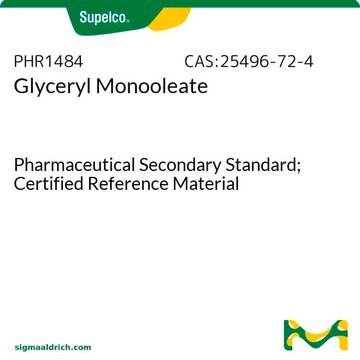1295742
USP
Glyceryl monooleate
90%, United States Pharmacopeia (USP) Reference Standard
Synonym(s):
Glycerol mono-oleate
About This Item
Recommended Products
grade
pharmaceutical primary standard
API family
glyceryl monooleate
Assay
90%
manufacturer/tradename
USP
application(s)
pharmaceutical (small molecule)
format
neat
storage temp.
2-8°C
InChI
1S/C21H40O4/c1-2-3-4-5-6-7-8-9-10-11-12-13-14-15-16-17-21(24)25-19-20(23)18-22/h9-10,20,22-23H,2-8,11-19H2,1H3/b10-9-
InChI key
RZRNAYUHWVFMIP-KTKRTIGZSA-N
Looking for similar products? Visit Product Comparison Guide
Related Categories
General description
Application
Analysis Note
Other Notes
Storage Class Code
11 - Combustible Solids
WGK
WGK 1
Flash Point(F)
Not applicable
Flash Point(C)
Not applicable
Certificates of Analysis (COA)
Search for Certificates of Analysis (COA) by entering the products Lot/Batch Number. Lot and Batch Numbers can be found on a product’s label following the words ‘Lot’ or ‘Batch’.
Already Own This Product?
Find documentation for the products that you have recently purchased in the Document Library.
Customers Also Viewed
Our team of scientists has experience in all areas of research including Life Science, Material Science, Chemical Synthesis, Chromatography, Analytical and many others.
Contact Technical Service








